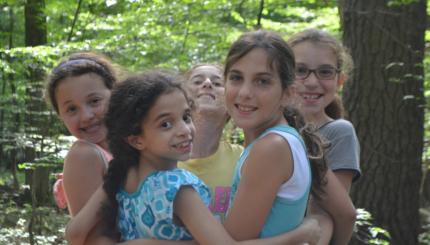Last week, the Foundation for Jewish Camp hosted our biennial conference, Leaders Assembly, in New Jersey. The topic of inclusion was high on the agenda and I engaged in so many invigorating conversations with colleagues about the topic and what each camp hopes to achieve within their own camp communities. Alexis Kashar, a civil rights and special education attorney, spoke to attendees about how growing up deaf impacted her access to the Jewish community. I was particularly struck by Alexis’ description of the effect that living in a home with a family with two parents and a sibling who were all deaf had on her sister who is hearing. Because synagogue life and supplemental school were inaccessible to the family, her sister was never introduced into it. Alexis stressed to us how inclusion has a ”ripple effect” and can profoundly affect the lives of the family of the person with disability.
Just one day after the close of the conference, I read the report that had just been released from the Centers for Disease Control and Prevention announcing that the escalating numbers of Autism Spectrum Disorder (ASD) diagnosis continued to rise. According to the report, one in 68 children are now believed to be diagnosed with ASD, a group of developmental disabilities that can cause significant social, communication and behavioral challenges. It reaffirmed for me the important work that our camps can do to engage children with disabilities and their families and continuing to evolve in order to embrace them in the best way possible.
People with ASD are common and prevalent members of any group of youth or adults. The drive towards inclusion is recognition of the new normal in our lives. In the past, specialists were sought to address the particular needs of individuals who “didn’t fit,” in a hope to “help them succeed.” But the numbers tell us that this is not a fringe issue. As camps continue to accept more and more children with a variety of disabilities, I hope that staff training focused on caring for children with disabilities will be offered to all staff so that everyone can better understand and interact seamlessly with a variety of capabilities and needs. Sports specialists, swim instructors, and other recreational specialists will likely be challenged to use techniques that will engage children who are not naturally drawn to activities such as sports and who need to be coached differently in order to acquire certain skills. Visual directions, visual schedules, sensory considerations and flexibility in choice of activities will likely become a part of necessary accommodations so that camp programs can become naturally inclusive. I can say that in all of the conversations and sessions in which I participated in at Leaders Assembly last week, I was happy to see that the field of Jewish camping is moving toward a more inclusive society where all campers will be able to experience success.


